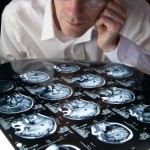Your Brain on Alcohol
Does anyone remember the “this is your brain – this is your brain on drugs” commercials from the 1980s? Bold messaging and memorable imagery combined to create an idea that is still sticky today.
Is the brain fried like an egg in a pan? Are there lasting effects after the hangover? Are we really killing brain cells with every beer?
Alcohol makes cells less likely to work. The drug ethanol causes the cells to be less responsive to neighboring cells. It is a sedative. But wait, there’s more.
ALCOHOL BURNS
Before the cocktails even go to your head they have to get past your guts. In fact, the lining of the mouth absorbs some alcohol, but most of it reaches the blood stream via the stomach or intestine. Alcohol is locally toxic to cells by chasing out water. It is processed in the liver where more chemical burning takes place.
At high enough concentrations alcohol can overwhelm the liver’s ability to keep up. The large organ under your right ribcage is charged with clearing the stuff. It does a magnificent job, up to a point.
First the cells of the liver swell. Later they accumulate fat. Eventually they die and are replaced by scar tissue. This process is called cirrhosis. You don’t want to let things get this far because the there is no way to reverse cirrhosis.
TARGET ACQUIRED
The only reason I ever drank alcohol was for the effect on my brain. From pleasantly buzzed to completely wasted the action was all happening between my ears. This is where the addiction specialists get the idea that this is a “brain disease.” Where else would it be taking place?
Cells communicate with their neighbors. They use a delicate combination of electricity and chemistry. Alcohol is a crappy drug. Very imprecise. It interferes with messages being passed from neuron to neuron in an unpredictable way.
Initially the alcohol suppresses the little voice inside your head that says, “don’t do that.”
• Don’t tell that joke.
• Don’t flirt with that person.
• Don’t get out there and dance the electric boogaloo.
For a little while you feel calm and brave. The thoughts do not change that much but they won’t bother you so much.
With a few more drinks the brain is suppressed altogether and the sedative effects become more general.
WHAT HAPPENED?
If you keep drinking and manage to stay awake other strange things happen. You can be conscious but not remember what you did. The blackout is failure of your brain to convert short-term memories into long ones. You are doing things but can’t recall them later. Embarrassment and/or terror dawn later as you reassemble the pieces.
With very high or chronic moderate exposure to alcohol even worse things happen to your brain.
The cells can only take so much before they give out[i].
KILLING BRAIN CELLS
Yes. You do kill brain cells when you drink alcohol and no, not just the weak ones. Alcohol has direct effects on the cells themselves, especially on their connections to other cells. The brain scans of long-term heavy drinkers make me sad when I see them.
The thin watery fluid in which the organ usually floats replaces healthy brain tissue. Those cells are gone baby, gone.
If you smoke cigarettes the whole brain-dissolving shuffle goes even faster[ii].
STEM CELLS TO THE RESCUE
The good news is your brain can take a joke – to a point. Time was science thought that there was no new cells created in the brain once you were born. We now know that not only do new cells form but also they form in two ways.
Stem cells float around in the bloodstream and land in the brain. They are coaxed to transform into brain cells. The neighbors do the rest, hooking up the connections.
More bizarrely, the non-neurons can be changed into nerve cells. That’s right. Supporting cells can change into information-carrying cells. It is like wood and plaster in your house morphing into the phone wires and TV cables in the walls. Not kidding.
AFTER THE HANGOVER
It is clear that alcohol hurts the brain. It is also clear that up to a point the cells will recover just fine from the alcohol toxicity. The problem comes when you use the drink to deal with your thoughts a little too often.
Alcohol works to change your thoughts. That’s the point of drinking it. Don’t be surprised when one of your new thoughts is “let’s have another drink!”
If you have a strong feeling that you are not okay or that others have something that you don’t then drinking can give you a dramatic sense of relief. The allure of the alcoholic drink can become very powerful. Many of my patients describe the feeling of the first drink as magical. All of the anxiety is washed away in a few swallows.
This is the real risk. Sure, if you drink a lot for a long time you will get brain damage. The trouble is this happens slowly. Insidiously.
HITTING BOTTOM
Hitting a “bottom” is when your life gets worse faster than you can lower your standards. Each time you drink to get away from yourself you get a little worse and feel a little lower.
Part of why it is so hard to recover is the detox from alcohol. Alcohol suppresses the nerve activity and the nerves try to overcome the sedation. When you stop drinking the now hyperactive nerves are jumpy and irritable. Too sensitive.
The real challenge is dealing with all the feelings and fears that have never really been processed. The problem is only alcohol while you are drinking it or recovering from drinking it. The actual trouble is what you think about yourself and the world around you.
The only thing wrong with you is that you think there is something wrong with you.
[i] Molecular Neurobiology
Volume 24, Numbers 1-3, 107-129, DOI: 10.1385/MN:24:1-3:107
Molecular mechanisms of glutamate receptor-mediated excitotoxic neuronal cell death
Rita Sattler and Michael Tymianski
[ii] Alcohol Clin Exp Res. 2005 Aug;29(8):1484-95.
Quantitative brain MRI in alcohol dependence: preliminary evidence for effects of concurrent chronic cigarette smoking on regional brain volumes.
Gazdzinski S, Durazzo TC, Studholme C, Song E, Banys P, Meyerhoff DJ.
Department of Radiology and the Department of Psychiatry, University of California San Francisco, San Francisco, California 94121, USA. spg@itsa.ucsf.ed


